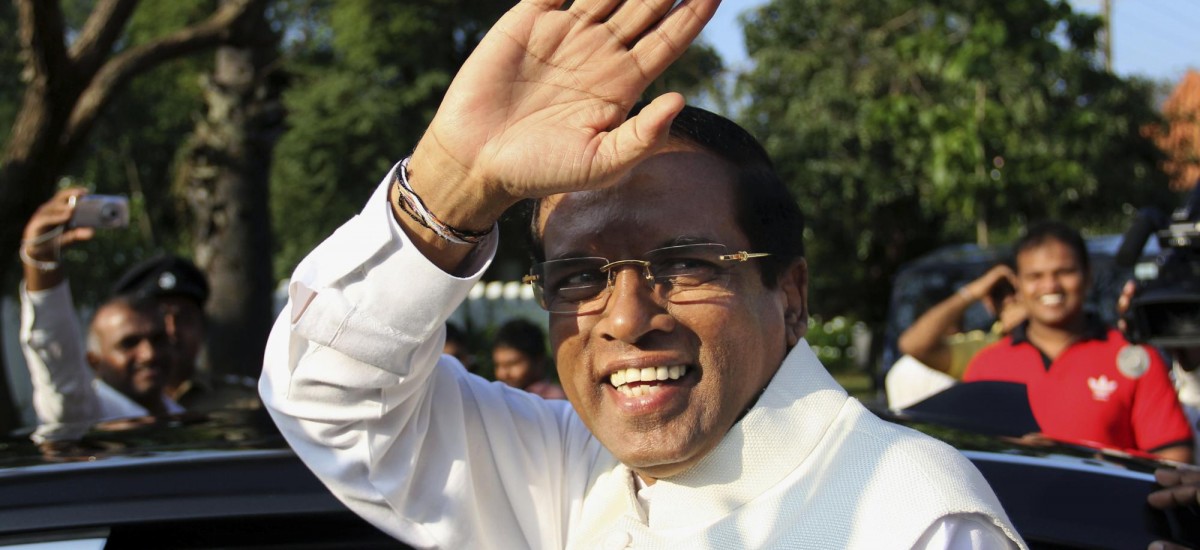AP Photo/Sujeewa Kumar, via The Guardian
Saturday 9th January 2016, will mark the completion of one year of the Maithripala Sirisena presidency and it is an opportune time to reflect on the past one year of the Maithri Palanaya.
The first aspect of course about the Maithri presidency is that it occurred at all. Mahinda Rajapakse was deeply entrenched in power and seemingly determined to govern for generations. However the inevitability or unsustainability of a purely mono ethno religious support base, even that of the majority community, caught up with Mahinda Rajapakse. Even the Sinhala people, or at least a significant section of it seems to have tired of their champion, governing Sri Lanka like a personal fiefdom, with family bandyism, rampant corruption and scarce respect for the rule of law.
The inauguration of the Sirisena Presidency created a sharp change in the Sri Lankan presidency and how Sri Lanka was governed, most radically in the area of democratic good governance, the key issue on which the presidential election was fought. Sri Lanka immediately became a freer, tolerant and inclusive society. Roads around Colombo Fort which were blocked off was opened, the country wide deployment of the military under the Public Security Ordinance was discontinued, giving the civilian police force once again the primary responsibility for law and order. Some of the war affected Tamil civilians; living was IDPs in their own country were allowed to return to their hereditary and ancestral lands and the pervasive culture of fear which the Rajapakse’s engendered and exploited was removed. The white van culture was discontinued.
19th Amendment and Independent Commissions
Sri Lankan voters one year ago, had a clear choice, between Rajapakse’s promise of an economic developmental society and Sirisena’s promise of a democratic society, with the implication that democratic good governance was not mutually exclusive with economic development. A majority of Sri Lankan’s opted for a more democratic, pluralist and well governed society to those desiring even more of Rajapakse rule. Sri Lanka and Sri Lankans have basically received the free or freer society they voted for. Undergirding this change was the 19th amendment to the Constitution which limited the powers of the executive presidency, reestablished term limits and essentially repealed the draconian 18th amendment to the Sri Lankan constitution, which Rajapakse had pushed through to consolidate his iron grip on power. Further subsequent to the 19th amendment and the subsequent parliamentary elections which saw Rajapakse allies and cronies relegated to a rump in Parliament, the independent Commissions were formed, ensuring that Sri Lanka once again become a society governed by institutions and laws.
Dramatic improvement in Foreign Relations
The field of foreign relations saw a dramatic change around in Sri Lanka’s international relations as a result of the Sirisena Presidency. Sri Lanka, which had become a near international pariah state, due to the attitude, actions and policies of the Rajapakse Administration, suddenly witnessed a sea change in its relations with the outside world. Whether with the UN, the EU and the Western nations or especially with India, relations improved significantly. Sri Lanka which was facing censure and worse at the UN Human Rights Council in Geneva, was able to co-opt the process and make what was previously an adversarial process, into a cooperative endeavor between Sri Lanka and her friends. The very difficult relationship with our key donors and trading partners, especially the EU, US, India and other western allies were reversed and repaired due to addressing and dealing with their legitimate concerns regarding Sri Lanka’s international law and treaty obligations on human rights and accountability issues.
End to attacks on Mosques and Churches, while reestablishing rule of law
The consequential departure of the former Defense Secretary and some other changes in the defense establishment witnessed a complete and immediate halt to anti Muslim and anti Christian violence by the organized hate groups, patronized by the previous regime. These hate groups still retain their extremism but cannot indulge in violence with impunity.
A crisis for democracy in Sri Lanka was the low depths to which the rule of law and the justice system had sunk to. The ultimate nadir was surely the purported removal of Chief Justice Bandaranaike through a fatally flawed process and the installation of an interloper as Chief Justice. Ending the farce which was the higher judiciary under an interloper was a significant step towards an impartial judiciary.
Looking ahead to a new constitution
The year 2016, promises a new constitution which abolished the executive presidency, changes the electoral system and reforms the Sri Lankan state, so that it accommodates the full diversity of her society, which through devolution of power together with power sharing at the center and greater and guaranteed fundamental, individual democratic freedoms promises to create the platform for a new Sri Lanka in the decade ahead. While a new constitution may not be a panacea for all our ills, if the supremacy of a new constitution is adopted with the enforcement through a constitutional court, it will certainly form the foundation for addressing the many other developmental and social challenges which Sri Lanka needs to address, for the shared prosperity of all her peoples.
(The writer is the Chairman of the Resettlement Authority. The views expressed are strictly personal)

